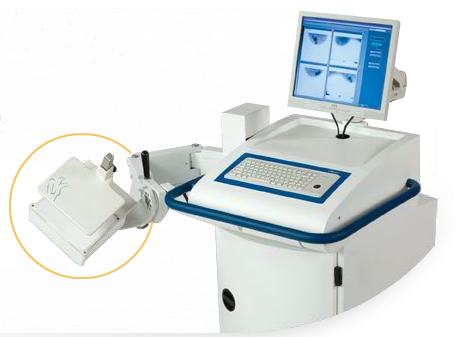
March 24, 2011 – A new study by Craig Thiessen, M.D., director of radiology for West Houston Radiology L.L.P. and North Cypress Medical Center in Houston, presented last week at the National Consortium of Breast Centers Annual Meeting, found that the improved photon sensitivity of new detector technologies such as PSPMTs and CZT should be capable of reducing the radiation dose patients receive from breast-specific gamma imaging/molecular breast imaging (BSGI/MBI) studies by 75 percent. However, low dose imaging is currently an off-label use of the radiopharmaceutical, and there are several prospective patient studies underway to validate the clinical feasibility of low dose imaging. BSGI/MBI is a molecular imaging tool for detecting early stage breast cancer, particularly for women who are at increased risk for the disease or have dense breast tissue. BSGI/MBI utilizes a radiopharmaceutical to visualize metabolic activity, revealing highly active areas that may be indicative of disease. A primary benefit of BSGI/MBI is that the exam provides a physiological map complementary to the anatomical map produced by mammography, and its ability to detect cancer is not affected by dense breast tissue as mammograms often are. It is also especially useful when mammographic or ultrasonic imaging studies are normal or discordant in the presence of clinical signs and symptoms. Thiessen, a nuclear medicine specialist and breast imager, said that "BSGI/MBI- as with positron emission tomography (PET) imaging, shows that molecular imaging is more advantageous in conjunction with standard anatomical evaluation of the body, and specifically the breast. Mammography, ultrasound and magnetic resonance imaging (MRI) look at various structures and patterns, whereas BSGI/MBI looks at the breast on a cellular level to help determine the presence or absence of disease." Thiessen notes that MBI with the Dilon 6800 Gamma Camera is as sensitive, more specific and more cost-effective than performing a diagnostic work-up with MRI. "BSGI/MBI is as safe and efficacious as other primary radiological exams; and even as new studies demonstrate that we can use lower doses to evaluate the breast, the current recommended dose is safe and only slightly higher than mammography," said Thiessen. Dilon Diagnostics currently has the only U.S. Food and Drug Administration (FDA) approved localization system for gamma-guided biopsy. "To date, Dilon's localization system/GammaLoc has shown sensitivity for diagnosis of areas of concern, and will advance breast imaging to a new level; where I believe that molecular imaging reveals changes that happen on a cellular level before we can see differences in structural recognition," Thiessen said. For more information: www.dilon.com


 February 18, 2026
February 18, 2026 









